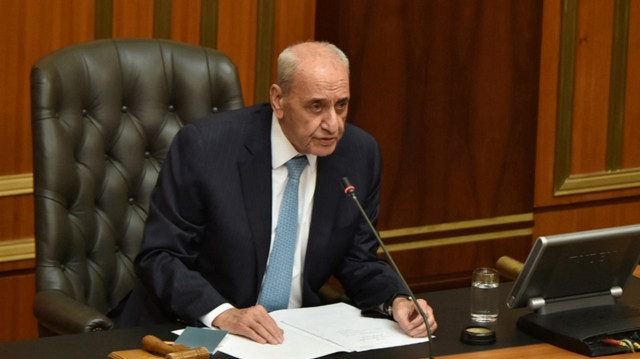
Nabih Berri urges political restraint amid dispute over government’s backing of US proposal to disarm Hezbollah
Lebanese Parliament Speaker Nabih Berri on Tuesday dismissed the possibility of ministers from his Amal Movement and Hezbollah quitting the government over a decision to strip armed groups of their weapons and place them under state control.
Last week, the government endorsed measures outlined in a US proposal, which include restricting arms to the state and deploying the Lebanese army in the country’s south.Hezbollah rejected the move, with its parliamentary bloc issuing a strongly worded statement describing the government’s position as a “dangerous coup.”
Speaking to the Lebanese daily Al-Joumhouria, Berri, who also leads the Amal Movement, said the resignation of the four ministers from the two groups “is not on the table at the moment.”He stressed that Lebanon is going through “exceptional circumstances that require all sides to act with the highest sense of responsibility and wisdom,” adding that preventing the country from sliding into sectarian strife remains a top priority.
“The Israeli enemy would be delighted to see discord among the Lebanese,” Berri warned, urging political actors to tone down rhetoric in line with this objective.US envoy to Damascus Thomas Barrack visited Lebanon in July and received a response from President Joseph Aoun backing Washington’s proposal on Hezbollah’s weapons and an Israeli withdrawal from southern Lebanon.
Lebanese Prime Minister Nawaf Salam has ordered the military to prepare an implementation roadmap for the plan, while Aoun unveiled a broader national proposal, including Israeli withdrawal, prisoner releases, and full state control over arms.
Cross-border warfare between Israel and Hezbollah began in October 2023 and escalated into a full-scale war in September 2024. As many as 4,000 people, including Hezbollah chief Hasan Nasrallah, were killed, and around 17,000 others were injured.
A ceasefire was reached in November, but Israeli forces have conducted near-daily attacks in southern Lebanon, claiming to target Hezbollah activity.Under the truce, Israel was supposed to fully withdraw from southern Lebanon by Jan. 26, but the deadline was extended to Feb. 18 after Tel Aviv refused to comply. Israel still maintains a military presence at five border outposts.







